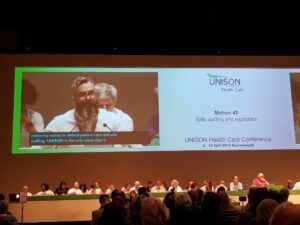NHS pay reforms still urgently needed, warn Unison members

Unison members have called for pay parity for all nurses in the UK, and reiterated a desire to withdraw from the NHS Pay Review Body after years of late wage uplifts.
At the 2024 Unison National Health Care Service Group Conference, held in Brighton this week, nurses, midwives and other health workers discussed their concerns about the pay-setting process in the NHS.
“We can’t just let April go by yet again with our pay [rise] being overdue”
James Anthony
James Anthony, a nurse specialist and member of the Unison health service group executive, outlined a motion to the conference.
The motion called for the union to continue to push for “full collective bargaining” in all parts of the UK for health workers, which would see Unison negotiate pay directly with the UK Government, instead of via the pay review body (PRB).
Delegates at the 2023 conference previously voted to “call time” on the PRB.
The motion further called on the union to keep promoting pay-setting reform ahead of a probable 2024 general election and to continue Unison’s Put Pay Right campaign.
It also called for the union to plan ahead for “punitive legal changes” to legislation around strikes to ensure industrial action can happen.
Mr Anthony also spoke about the need to improve pay for those on the lowest pay bands of Agenda for Change.
“Conference, Unison has set out our plans to put NHS pay right, a proper pay rise, the right banding and a shorter working week based on what our members have said and our priorities,” he said.
“We are absolutely clear that, as we said last year, the time is over for the PRB because we know it is only through direct negotiations that we can deliver those priorities.
“If we look in Scotland, they have used direct negotiations to deliver a shorter working week with no detriment. We want exactly the same in every part of the country.”
Mr Anthony further reiterated the union’s criticism of the delay to the 2024-25 pay deal, which should have been implemented on 1 April.
He added: “We can’t just let April go by yet again with our pay [rise] being overdue.”

James Anthony addressing a Unison health conference in 2019
The union, Mr Anthony said, was currently consulting members about an appetite for industrial action should there be more delays to the rise, or if it is not good enough.
Gillian Hobson, a representative of Unison North West, supported the motion and said that “poverty pay must be eradicated” from the lowest bands of Agenda for Change.
She also used the debate as a chance to highlight the need to improve sick pay, adding: “Often this ensures viruses are kept out of hospitals, and our patients can be supported in an appropriate environment.”
Other members from across England backed the move away from the PRB and towards collective bargaining.
Meanwhile, Pauline Brady, a registered nurse based in Scotland, spoke in favour of the motion, but said that – from experience – moving away from the PRB “doesn’t solve everything”.
She said that while it meant pay negotiations in Scotland were easier, there were still delays.
She added that underinvestment in the devolved nations from the UK Government was causing issues despite the move away from the PRB and suggested that, no matter who wins the next general election, Unison would need to continue the pay debate.
“We are very aware that NHS pay has been most effected under 14 years of Tory government,” she said.
“But we need to be very aware that only [Sunday], Wes Streeting said there is ‘no money without major surgery or reform’ in the NHS, and we know what that can mean for our services.
“It is not as simple as blue or red – as PRB or no PRB, we need to continue to fight.”
The conference voted overwhelmingly in favour of supporting Mr Anthony’s motion.
Members also debated a motion condemning the UK Government for allowing Northern Irish healthcare staff to fall out of pay party with England again last year.
The motion stated that the union was “appalled” at the withholding of funding, and again called on the union to directly engage with the UK Government outside of the PRB.
“It is not as simple as blue or red – as PRB or no PRB, we need to continue to fight”
Pauline Brady
In these negotiations, the motion said, the union must make sure Northern Ireland is included in the 2024-25 pay deal and that funding for it comes centrally via Barnett Consequentials, not out of the Northern Irish health budget.
Putting forward the motion, Unison Northern Ireland chair Stephanie Greenwood said healthcare workers in the country had been “shabbily treated”.
She called for pay parity for Northern Irish health workers going forward and said: “Unity is strength, division is weakness. The essence of trade unionism is social uplift for all.
“Please give the Northern Irish delegation your full support, and show that you have their backs.”
The motion echoed a similar one submitted by the Northern Ireland branch in 2023, which asked that they were not “left behind” the rest of the UK.
Dawn Ward, Unison Wales chair, supported the motion, and said: “Wales supports our Unison family Northern Ireland’s fight for pay parity with England, and we applaud the sustained action they have taken.”
The motion was supported unanimously by voting delegates at the conference.
Across the conference, members also voted on motions about safer staffing levels, mental health for healthcare workers, enhanced mileage reimbursement, and a separate pay spine for nurses – the latter of which Unison delegates unanimously voted to oppose.






